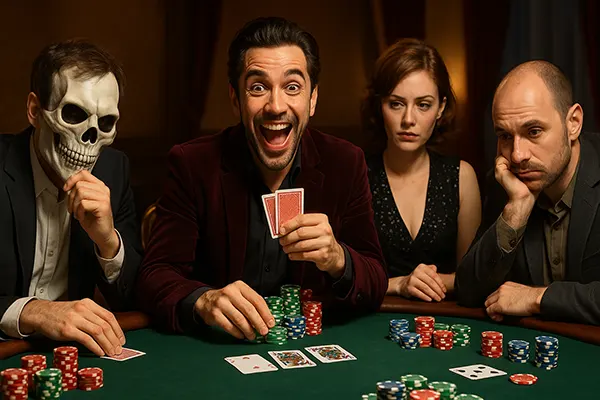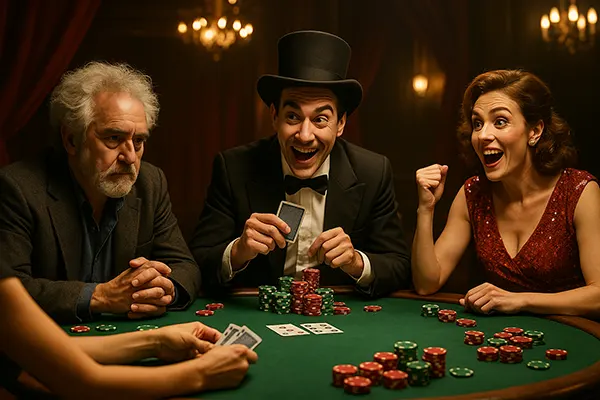Gambling and Theatricality: Why Players Behave Like Actors

At first glance, gaming tables might seem like purely logical arenas where skill and probability rule. Yet anyone who has spent time observing them knows they often resemble miniature stages. Players slip into distinct roles, masking nerves with confidence, or turning caution into spectacle. This blend of risk and performance is what makes gaming feel more like theatre than mere competition.
The Archetypal Roles at the Table
Within any competitive game, certain recurring player archetypes emerge. These roles are shaped by psychology, strategy, and the social atmosphere surrounding the table. Each one adds a unique dramatic layer to the shared experience.
The cold-blooded strategist embodies restraint and control. This player rarely reveals emotion, choosing instead to calculate every move with measured precision. Their aim is not only to outplay opponents but to unsettle them by showing no sign of doubt or hesitation.
The bluffing showman thrives on attention. They talk loudly, laugh easily, and make exaggerated gestures with each bet. This theatrical display hides their true intentions and pressures others into folding, proving that confidence can be as powerful as skill.
Then there is the silent genius — a figure who rarely speaks yet dominates through observation. Their stillness becomes intimidating, their timing impeccable. Others may underestimate them at first, only to watch in disbelief when they seize victory at the perfect moment.
How Emotions Become Stage Performances
Emotions rarely appear raw at the table. Instead, they are reshaped into deliberate performances. Excitement becomes wide smiles and confident postures, while anxiety hides behind forced calm or over-the-top bravado. These masks both protect and manipulate.
Victories often become full-blown scenes. Players push chips forward dramatically, basking in applause-like reactions from their peers. It is not just about winning — it is about winning with style, creating a moment that others will remember.
Even losses are transformed into acts. Some exit with theatrical sighs, while others laugh off disaster as if it were part of the script. This self-staging helps preserve pride and maintain an aura of control despite defeat.
The Psychology Behind Playing a Role
Adopting a role can ease psychological pressure. By acting as a character rather than as themselves, players create emotional distance from risk. This detachment allows clearer thinking and shields self-esteem from the blow of failure.
Roles also function as social signals. A bold persona can intimidate opponents, while a calm exterior may lure them into misjudgement. The performance influences not just perception, but actual decision-making at the table.
There is also an addictive quality to role-playing. Once a persona earns success, players often reinforce it, exaggerating traits until they become second nature. The table becomes a stage they return to, not only for competition but to reprise their role.
Amusing Observations from Real Games
Real-world tables often provide moments worthy of theatre. Some players narrate their hands aloud as if performing for an audience, turning even small pots into dramatic sagas. Others wear trademark accessories — sunglasses, scarves, lucky charms — like costume pieces.
Occasionally, two showmen clash in verbal duels, trying to outtalk each other while betting. The spectacle draws laughter from onlookers and tension from rivals who struggle to follow the chaos. In these moments, the line between gaming and acting blurs completely.
Even the quiet ones contribute to the drama. A single raised eyebrow or perfectly timed pause from a silent genius can shift the whole table’s mood, proving that subtle gestures can be as theatrical as grand ones.

Why This Theatricality Endures
Part of the allure is that risk heightens emotion, and heightened emotion craves expression. Winning or losing money magnifies feelings, and performance becomes a natural outlet. Without theatrics, much of the tension and thrill would vanish.
Another reason is the communal nature of games. Players feed off each other’s energy, creating shared stories with each hand. Theatrical behaviour keeps the experience entertaining even for those not directly involved in the action.
Ultimately, this theatricality humanises the competitive environment. It reminds everyone that behind the chips and strategies are real people — nervous, proud, mischievous, and creative. And like actors, they return not just to win, but to perform again.
The Lasting Impression of Roleplay
These dramatic roles linger long after the games end. Regulars become known by their personas, and their reputations shape future encounters. A strategist is feared, a showman anticipated, a genius quietly respected.
Observers, too, carry these memories. They recount stories of legendary bluffs and charismatic performances more vividly than the actual outcomes of the games. The artistry leaves a stronger mark than the mathematics.
In this way, every gaming table becomes a stage. The players may chase victory, but what endures are the characters they create — living proof that competition and theatre are forever entwined.
